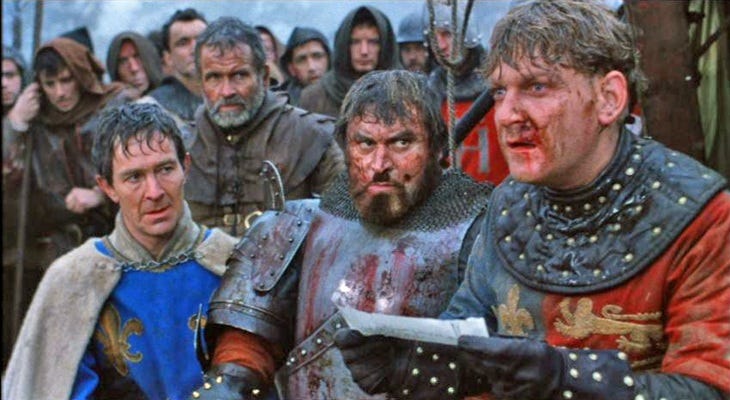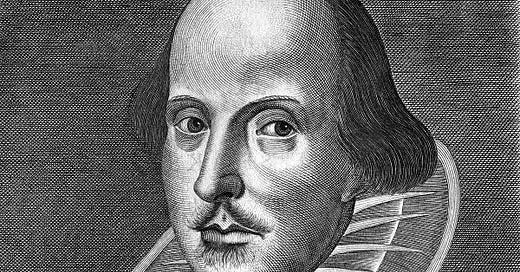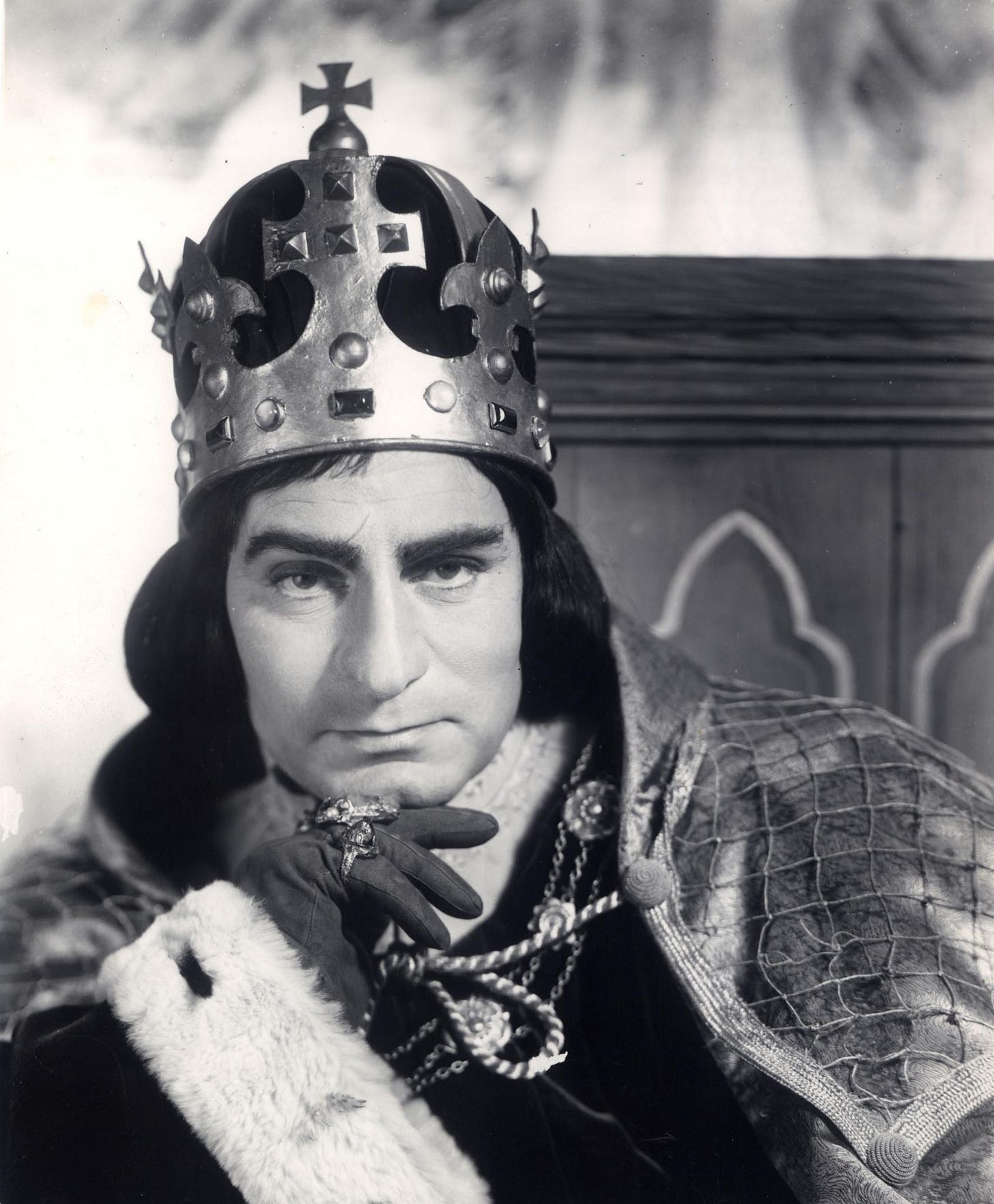Note: Tradition has it that William Shakespeare was born and died on April 23, 1564: Saint George’s Day. That the greatest English writer both entered and departed this world on the feast day of England’s patron saint is pleasing in its symmetry—and if it isn’t really so, well, it should be.
I wrote and published this article in the early days of my Substack sojourn, when I and my readers might well have been described as “We few, we happy few.” Looking back, I found that “Crowns and Coronets” has had eighty-one readers since September 22, 2022, its date of publication.
The article emerged from my musings over the death of Queen Elizabeth II on September 8, 2022. She was, after all, the namesake of Shakespeare’s queen, Elizabeth I (reigned 1558-1603), whose family history was the source material for many of his history plays. Rereading it recently, I thought that it might be of some interest to the subscribers I’ve acquired in the years since it first appeared. For this republication, I’ve revised and expanded “Crowns and Coronets.” In Shakespeare’s words, “The subject will deserve it.”
All the world knows that King Richard III—Crookback Dick—was a monster of evil who murdered his way to the English Crown. But in A History of the English-Speaking Peoples, Winston Churchill noted that Richard’s contemporaries seemed never to have noticed his hunchback or his withered arm. Other historians have cast doubt on the story that the sons of his late brother, King Edward IV, the elder of whom was the rightful heir to the throne, were murdered at Richard’s instigation. Indeed, it seems probable that the princes were killed on the orders of Henry Tudor, Earl of Richmond, the man who deposed Richard and replaced him as King Henry VII, first of the Tudor monarchs.
Yet all the world knows that Crookback Dick was a monster of evil.
That was William Shakespeare’s achievement. His play The Tragedy of King Richard III was written in the reign of Queen Elizabeth I, the granddaughter of the man who displaced Richard, and it was politic as well as dramatically shrewd for the playwright to present him as a murderous, Machiavellian villain. Richard III was, in the parlance of our day, Master Will’s first big hit. Despite its technical flaws and the fact that it’s a specimen of Tudor propaganda, it remains one of his most popular plays. Indeed, the blackening of Richard’s historical reputation, though regrettable, seems a small price to pay for such a rollicking good time:
"Why, I, in this weak piping time of peace, Have no delight to pass away the time, Unless to see my shadow in the sun And descant on mine own deformity. And therefore, since I cannot prove a lover To entertain these fair well-spoken days, I am determinèd to prove a villain And hate the idle pleasures of these days. Plots have I laid, inductions dangerous, By drunken prophecies, libels, and dreams, To set my brother Clarence and the King In deadly hate, the one against the other…"
That’s Richard, exercising his sinister charm, taking the audience into his confidence as he charts his path to power.
Monarchy—its splendors, squalors, and bloody passages—was grist to the playwright’s mill. Shakespeare served his apprenticeship in the War of the Roses, which he chronicled in the three parts of Henry VI. By comparison with his mature works these plays are nothing special, though here and there, as with his vivid depiction of Jack Cade’s Rebellion (Part 2), Shakespeare’s dawning brilliance shines forth. Ancient and recent history provided him with copious material; for instance, he plundered Plutarch for Julius Caesar. This was perhaps Shakespeare’s best-wrought play, unusual for him in its observance of the dramatic unities, and though it featured no king, there was a crown at stake:
“I saw Mark Antony offer him a crown (yet ’twas not a crown neither; ’twas one of these coronets), and, as I told you, he put it by once; but for all that, to my thinking, he would fain have had it. Then he offered it to him again; then he put it by again; but to my thinking, he was very loath to lay his fingers off it. And then he offered it the third time. He put it the third time by, and still as he refused it the rabblement hooted and clapped their chopped hands and threw up their sweaty nightcaps and uttered such a deal of stinking breath because Caesar refused the crown that it had almost choked Caesar, for he swooned and fell down at it. And for mine own part, I durst not laugh for fear of opening my lips and receiving the bad air.”
That’s “honest Casca,” describing how Caesar so very reluctantly declined the crown he so very much desired. But “moderate men” with “the noble Brutus” at their head feared that someday, Caesar would yield to the royal temptation. And so on the Ides of March they stabbed him to death in the Senate House, Brutus justifying the bloody deed to the Roman people, as imagined by Master Will:
“If there be any in this assembly, any dear friend of Caesar’s, to him I say that Brutus’ love to Caesar was no less than his. If then that friend demand why Brutus rose against Caesar, this is my answer: not that I loved Caesar less, but that I loved Rome more. Had you rather Caesar were living, and die all slaves, than that Caesar were dead, to live all freemen?”
But the Roman people were not convinced. They listened instead to Mark Anthony:
"But yesterday the word of Caesar might Have stood against the world. Now lies he there, And none so poor to do him reverence. O masters, if I were disposed to stir Your hearts and minds to mutiny and rage, I should do Brutus wrong and Cassius wrong, Who, you all know, are honorable men. I will not do them wrong. I rather choose To wrong the dead, to wrong myself and you, Than I will wrong such honorable men."
Shakespeare, that most enigmatic figure in the canon of English literature, always seems equivocal in his attitude towards monarchy. The Crown of Denmark was fatal to the father, the uncle and the son. Old King Lear went mad. Macbeth was possessed by the demon of bloody ambition. Cleopatra threw it all away for love. Richard II was imprisoned and murdered. Crookback Dick was slain on the battlefield by the man who aspired to replace him. Even Henry V, superficially a patriotic epic, expresses a shadow of a doubt about that “star of England.” In the play’s prologue, Chorus strikes a subtly discordant note:
"O, for a muse of fire that would ascend The brightest heaven of invention! A kingdom for a stage, princes to act, And monarchs to behold the swelling scene! Then should the warlike Harry, like himself, Assume the port of Mars, and at his heels, Leashed in like hounds, should famine, sword, and fire Crouch for employment..."
“Famine, sword, and fire”: ominous, prophetic words!
And later in the play, Shakespeare calls upon a common soldier in the ranks of Henry’s army for a second opinion on “the quality, pride, pomp and circumstance of glorious war”:
“But if the cause be not good, the King himself hath a heavy reckoning to make, when all those legs and arms and heads, chopped off in a battle, shall join together at the latter day, and cry all ‘We died at such a place,’ some swearing, some crying for a surgeon, some upon their wives left poor behind them, some upon the debts they owe, some upon their children rawly left. I am afeard there are few die well that die in a battle, for how can they charitably dispose of anything when blood is their argument? Now, if these men do not die well, it will be a black matter for the king that led them to it, who to disobey were against all proportion of subjection.”
Henry has his answer ready, of course: “Every subject’s duty is the King’s, but every subject’s soul is his own.” Still, the common soldier’s words stir up an echo of unease. Was he speaking for Shakespeare, though? We cannot know. As ever, the playwright kept his own counsel.

In a famous essay, George Orwell nominated Rudyard Kipling as the unofficial historian of the red-coated, pre-machine gun British Army, citing the poet’s Barrack-Room Ballads and other works. Much the same could be said of Shakespeare and monarchy, particularly the English monarchy. That thought occurred to me as I reflected on the death of Queen Elizabeth II. Like Kipling, Master Will often played fast and loose with the historical record. But always, he had the essential themes well in hand: duty, responsibility, ambition, magnificence, ruthlessness, self-indulgence, hubris, nemesis.
And Shakespeare would have found plenty of dramatic material in the later history of the English monarchy. Not long after his time there was the English Civil War, culminating in the trial and execution of King Charles I. Oliver Cromwell would surely have made for a grand character in Shakespeare’s hands! Then there was the last King of America, poor old George III, and his scandalous younger brothers, the royal dukes, whom the Duke of Wellington called the “damnedest millstone around the necks of any Government that could be imagined.” Closer to our own time there was the Abdication Crisis of the 1930s, which rocked the monarchy to its foundations. And what might Master Will have done with the tragedy of Diana, “the People’s Princess”?
But such fancies all dissolve. We have only what Shakespeare left behind: a volume of profound meditations on kings, queens, princes, potentates, crowns and coronets. And as it happens, the last of his plays on the theme of monarchy, Henry VIII, opens with a ceremonial prologue well suited to the solemn occasion of Queen Elizabeth II’s passing:
"I come no more to make you laugh. Things now That bear a weighty and a serious brow, Sad, high, and working, full of state and woe, Such noble scenes as draw the eye to flow, We now present. Those that can pity here May, if they think it well, let fall a tear; The subject will deserve it…"





Thomas, if you haven't watched “Wolf Hall” the second season of which is currently appearing on the PBS Masterpiece Series I highly recommend it to you. The first six episodes premiered in 2015 (available on Amazon) and the second season of six episodes premiered last Sunday. The programs are remarkably good and although a fictional account of Tudor England they are (more or less) historically accurate.
If you are interested in the history of Tudor England, the best British historian of the era was James Anthony Froude. Two of his books that I recommend to you are,
“The Divorce of Catherine of Aragon.” it is free on the Kindle
https://www.amazon.com/Divorce-Catherine-Aragon-Imperial-Ambassadors/dp/1428653163
and
“The Reign of Mary Tudor.” Its also free.
https://www.amazon.com/Reign-Tudor-James-Anthony-Froude/dp/1434692299
A lovely piece. Always a joy to find other Shakespeare enthusiasts.
As it happens I was at the Globe theatre in London on the afternoon of 15th September 2022, watching Shakespeare's Henry VIII, while a few feet away thousands of people were still in line for miles along the Thames Path, hoping to view the late Queen Elizabeth II lying in state at Westminster.
In Henry VIII his daughter Elizabeth is born and Shakespeare has Archbishop Cranmer predict, of the future Elizabeth I,
"This royal infant—heaven still move about her!—
Though in her cradle, yet now promises
Upon this land a thousand thousand blessings,
Which time shall bring to ripeness. She shall be—
But few now living can behold that goodness—
A pattern to all princes living with her
And all that shall succeed"
And of course everyone in that Globe audience made the connection, there was a collective sigh, and even the actors paused and acknowledged the moment - we all felt the power of Shakespeare's words linked with the death of our own dear Queen Elizabeth, who had indeed lived up to her own promise and had been that "pattern to all princes".
Ps, for more of what Shakespeare probably thought about the nobility and their righteous wars, there's no better example than what he has Falstaff do and say, in Henry IV part 1, especially his "what is honour?"speech.